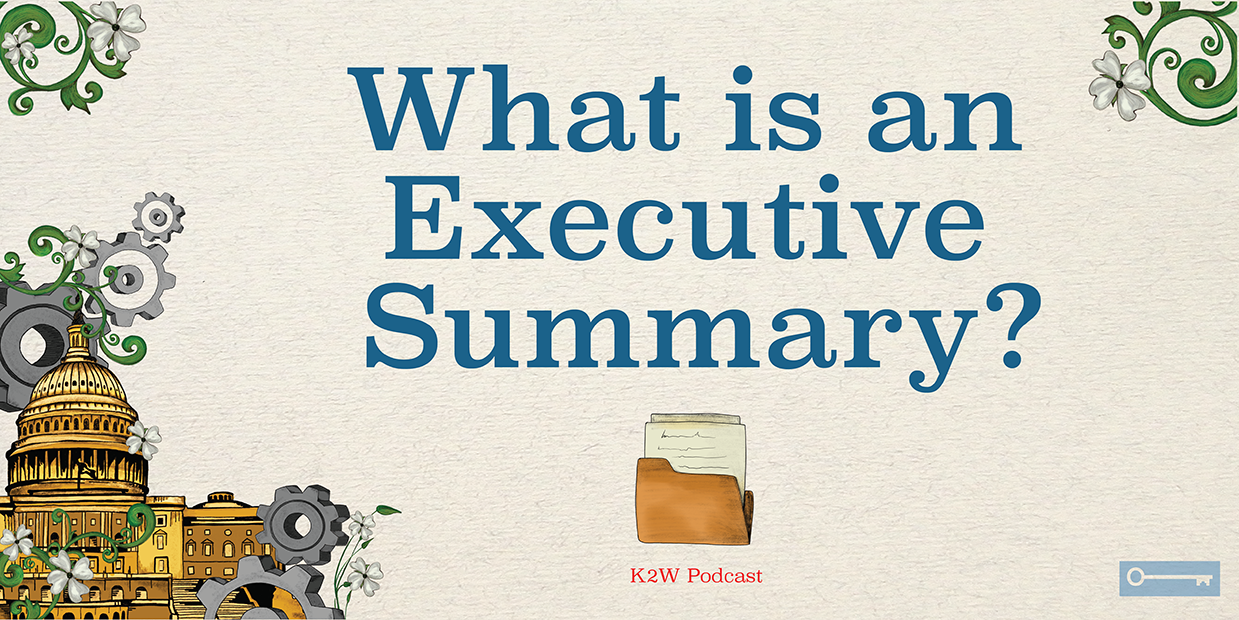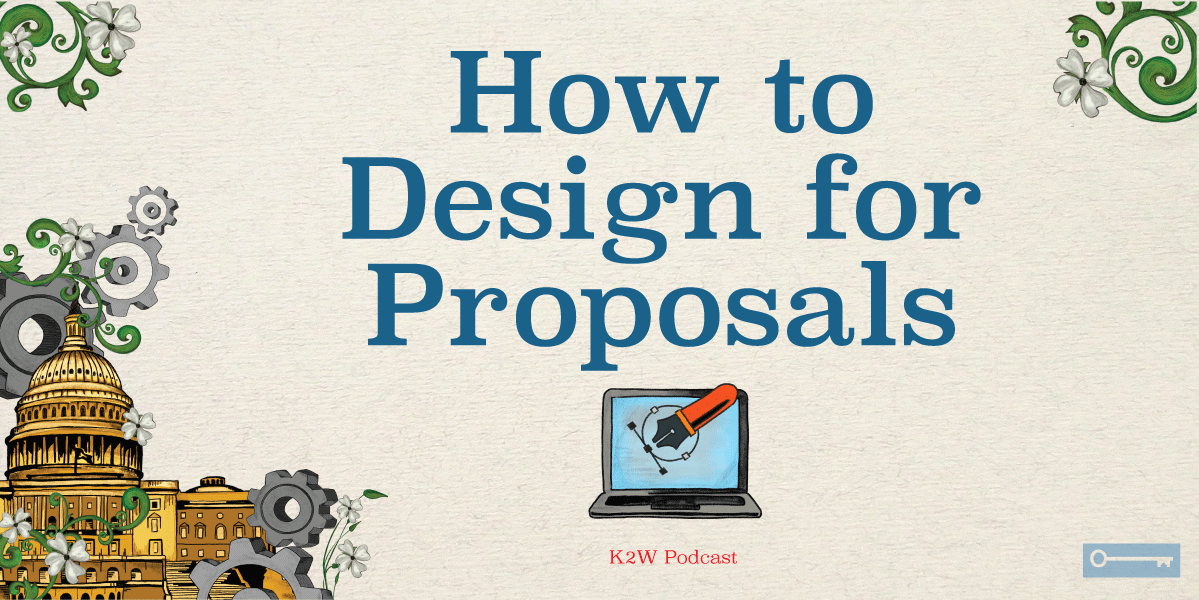It's a common problem, you're assigned as a Technical Writer on a proposal and when you show up there's an issue with getting content from the Subject Matter Experts (SMEs).
Some companies fail to understand the difference between a Technical Writer and a Subject Matter Expert. Others understand the difference, but their Subject Matter Experts may not be available to assist. What can you do?
In this week's episode we define the roles of a Technical Writer and SME. We also share how to set clear expectations for each role and offer tips on collaborative best practices.
Featured guest: Ellen Perrine, Proposal Consultant, AOC Key Solutions
Click the orange play button to listen to the episode. You can also listen on Apple I-Tunes or Soundcloud.
Prefer to read? Here's the transcript.
Raymond T.: Welcome to Keys to Winning, a podcast where we talk about government contracting topics such as proposal development, business development, win strategies, and more. Keys to Winning, produced by AOC Key Solutions, a leading bid and proposal development firm gives you a chance to learn from leaders and experts in their fields. I'm Raymond Thibodeaux, today's host of Keys to Winning.
Raymond T.: This is an interesting topic because it's something we see a lot, at least a form of it. You're assigned as a technical writer for say, a management volume for a proposal. When you show up, it starts to become apparent that technical writers are supposed to come up with the goods with limited input from subject-matter experts or SMEs. So, maybe it's something that needs to be made clear to company's looking to hire technical writers that technical writers are not SMEs. To talk to us about why that's such an important distinction is Ellen Perrine, who has spent more than 25 years as proposal manager and technical writer. Hi Ellen. Thanks again for being on the podcast.
Ellen P.: Thank you for having me Ray.
Raymond T.: Well, now that we've said it, that technical writers are not SMEs, why do you think we often confuse the two?
Ellen P.: I think there are some companies who don't understand the difference and when you work for them, you work at your peril, because at the end of the day they expect you to write the proposal from scratch with little or no input from them. This is dangerous because the company may refuse to pay you if you don't deliver what they're expecting. For example, a complete technical and management solution to the requirements of the scope of work. With these clients, the best approach is to explain the difference, verify that the client company actually has the subject matter expertise in-house to help you and then set clear expectations for your role and the client company's role in proposal development.
Ellen P.: Other companies such as small to medium sized businesses almost always understand the difference, but their subject matter experts are engaged on the day-to-day work of the company and are often not available to assist. What these companies need is a reliable teaming partner who can execute the work that the bidding company cannot and provide the required assistance.
Raymond T.: So how would you define the different roles of say SME and technical writer?
Ellen P.: A technical writer is really somebody that has general knowledge about the business, but he lacks the specifics of your particular business or your particular technical solution. A subject matter expert or SME, on the other hand, he probably works within the client company or maybe a subcontractor company and he can answer questions about the what and the how. What work is being bid, how it's going to be executed and also may have some idea of how the proposed solution is going to save the client time and money or maybe an innovative approach to solving a problem.
Raymond T.: That makes sense. Technical writers bring a generalized knowledge to a certain situation, mainly they've had broad experience either across many different companies or many different agencies. And by and large, the processes for managing, ensuring quality and tracking risk tend to be very similar from one agency to the next or from one company to the next. But I think the real meat of a proposal is in the specificity of the solution. And for that it's very important to look to the SMEs. Still there has to be this collaboration between SMEs and technical writers. Is that fair to say?
Ellen P.: Absolutely. And I think when you couple this with a good sense of what the bidding company's customer's looking for, which is usually determined by your BD and capture folks, you can write your proposed technical solution to meet specific customer needs and highlight your specific capabilities and advantages. And when you do that, you automatically significantly improve your chances of winning.
Raymond T.: Yeah. A term that comes to mind sometimes is golden unicorn, which is a way to describe this very unique, specialized and probably very hard to find person who can provide this very detailed knowledge.
Ellen P.: Yes. Especially if they're trying to get it from outside the company. A SME is a person who probably works in the organization, has a day job, and is unavailable. And that's the problem. The people that are closest to the work are not available to assist. And I've seen this time and again within companies. I know companies sometimes and will incentivize their SMEs to actually help write proposals so that there's something in it for them to go the extra mile to not only perform their regular job, but to assist in trying to get new business. And some SMEs are more willing to do that than others.
Raymond T.: What do experienced technical writers bring to the table? Are they capable of say, leading a solution or making suggestions about the proposed organizational structure and manage a project, or is that clearly outside of their scope of work?
Ellen P.: Depending on a number of years of experience that the technical writer has, and maybe where he or she has worked in the past in a similar industry or in the same industry for example, more senior-level technical writers are probably more capable of leading solutioning sessions. When and how to present these thoughts is kind of subject to the [inaudible 00:05:19] of the client company.
Ellen P.: For example, a client company may feel like they're in control of everything and they really don't want input from the technical writer. On the other hand, there are companies that could use some help and in that case, the best way to approach it is for a more senior technical writer to ask clarification questions and help lead the discussion such that the optimal [inaudible 00:00:05:38] solution is achieved or the best organizational chart is put forward. It may be that he or she can advise the client that a particular organizational chart may be too expensive for the client. So, I think that they can have this expertise and can approach it in a professional way they can help the effort.
Raymond T.: Interesting. This next question, it might be more peripheral to the topic at hand, but I think it's relevant in setting a company's expectations of a technical writer. How should technical writers be working with SMEs to develop proposal content? Should they be in a shoulder-to-shoulder collaboration, or is it enough just to have an occasional Q and A to get specifics to fill in some gaps in the narrative?
Ellen P.: Well, the answer to this question also depends on the company and the complexity of the work being bid. In the best of all possible worlds, for example, I would prefer to work shoulder-to-shoulder with my SME and have them readily available. However, if I have a lot of boilerplate material that I can use to get started, I may only need to check in with the SME when I need something to obtain some specifics to fill out some of the gaps in the narrative. And that's fine.
Ellen P.: In some of these proposals, they're all virtual and the SME may not even be in the same state as you are. So you're kind of stuck trying to get questions via email or through an interview over the phone in order to get the information that you need. If you're going to be in that kind of environment and conduct either submitting guided questions or conducting live interviews, the best thing you can do is prepare your questions concerning the specific information you need in advance. SMEs' time, if they're working within the company on a day-to-day job, is very limited in this situations. And they'll respect you more and they'll give you more valuable feedback if you don't waste their time. So, it can go either way, depending on how the company is set up.
Raymond T.: Well, I think that should do it for this podcast. And Ellen, I must say it is always a pleasure talking to you.
Ellen P.: It's great to be with your Ray.
Raymond T.: And we'll close there. I'm Raymond Thibodeaux and this has been Keys to Winning from AOC Key Solutions, Incorporated or KSI, a consulting firm that has helped companies across the country win billions of dollars in federal contracts. Learn more at www.aockeysolutions.com or follow us on LinkedIn. Be sure to subscribe for more podcasts in this series. And thank you for listening.
ABOUT KEYS TO WINNING:
Keys to Winning is a podcast that shares practical advice for GovCon professionals from industry experts. Topics covered include Proposal Development, Government Contracting, VOSBs, WOSBs, and more. Episodes are 15 minutes or less and are posted bi-weekly on Thursday morning. The podcast is hosted by Raymond Thibodeaux, a Senior Proposal Specialist with AOC Key Solutions.







